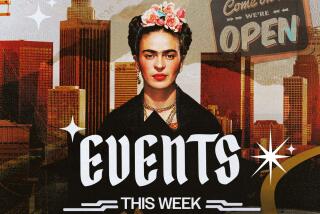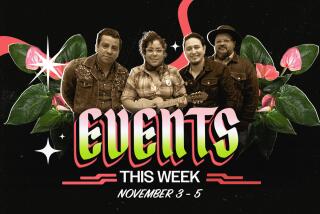Great Diversity for Black History Month
February is Black History Month, and numerous celebrations, commemorations and events are taking place in and around Los Angeles.
Navigating the melange of museum exhibitions, theater presentations, musicals, dance performances and film festivals can be a little daunting. So what’s a parent, aunt, uncle or guardian of an impressionable young mind to do?
“Parents should determine the activities by the age of their children,” says Alvin F. Poussaint, director of the Media Center of the Judge Baker Children’s Center in Boston. “Anything at a children’s museum is something you can take young children to as early as 1 or 2. Not that they’ll understand much, but they’ll see pictures of people who look like them, and that in its own way is a celebration.”
It’s a little trickier for those kids reared on BET, MTV and VH1 who may need a little more prodding. “For some kids, you can connect the African American experience to the African experience,” Poussaint says, noting that teens would be more partial to activities involving music and dance.
“You can attend festivals where African drums and other things are being played, and this teaches them how this music became a part of American culture,” he says, “even programs that discuss the contributions to dance and hip-hop and to language that came primarily from blacks, words like ‘cool’ and ‘right on.’” He adds that children can also be engaged through reading and film festivals, which provide opportunities to explore pop culture icons of the present and past.
“They should take the opportunity to look at current people who are alive and prominent, like Stanley O’Neal, and Richard D. Parsons [chief executives of Merrill Lynch and AOL Time Warner, respectively] and Kenneth Chenault [chief executive-designate at AOL Time Warner], as well as people who are at the end of their careers, like Harry Belafonte and Sidney Poitier, the first black man to win an Oscar. These are just some of the things you can focus on.”
With so much to choose from, being selective is key. “You can’t just go to any event because it has ‘black’ in it,” cautions Maulana Karenga, chairman of the department of black studies at Cal State Long Beach and creator of Kwanzaa.
“The reason children find certain things about history uninteresting is that they don’t know why they’re studying it,” says Karenga, noting that children, who are never shy about receiving gifts, relate well to activities that offer tokens, such as books, a piece of art or sculpture, or culturally inspired jewelry.
“From that book, you study history; from that art object, you explain it and they can display it proudly. One of the things that we have to do with children is let them know that they’re not just [to study] history, but that they are a part of history.”
Like the community- and ancestral-based fundamentals he used in developing Kwanzaa, Karenga encourages programs that foster positive affirmations “that teach the best in African values and the greatness of African people.” But he cautions against productions such as “‘Uncle Tom’s Cabin,’ ... which does not affirm dignity. Children have to see themselves in their most expansive way.”
“Parents will have to use their judgment,” said Poussaint, referring to the programs featuring classic literature readings and plays about slavery.
“‘Uncle Tom’s Cabin’ is an old-style view, but it’s historical. I think it would be good for teenagers because it’s such a key part of American history,” Poussaint says.
It is beneficial, Poussaint adds, to involve all American children in Black History Month programs. “Black people who have white friends--or Asian and Latinos--should bring them and their children to these events,” he says. “This should be an opportunity to bring people together to celebrate the achievements of key Americans who have not been properly celebrated or recognized.”
Black History Events
* Kidspace Children’s Museum offers dance lessons with members of the African Dance Workshop of Mori Nimba, Feb. 10 at 2:30 p.m.; gospel ensemble Vessels of Honor will perform Feb. 16 at 2: 30 p.m.; and the drumming of the children of the Abalaye African Dance Ensemble will be presented on Feb. 23 at 2:30 p.m. 390 S. El Molino Ave., Pasadena. $5, adults and children 3 and older; $3.50, seniors; $2.50, children ages 1 and 2; free, children younger than 1. (626) 449-9144.
* Towne Street Theater presents “The Start of Conversation,” a series of seven one-act contemporary comedies by Stan Seller, Friday through Feb. 24. Fridays-Saturdays, 8 p.m.; Sundays, 3 p.m. Raven House, 5233 Lankershim Blvd., North Hollywood. $15. (213) 624-4796 or www.townestreet.org.
* Santa Monica College presents “Slavery,” a spoken-word and musical production by student Jonathan Payne, based on 1930s interviews of former slaves by the Federal Writers Project of the Works Progress Administration. Friday, 8 p.m.; Saturday, 2 and 8 p.m.; Sunday, 8 p.m. Santa Monica College Studio Stage, 1900 Pico Blvd., Santa Monica. $5. (310) 434-4319.
* The African American Cultural Center hosts a series of free lectures, “Conversations With Our History: From Ancient Egypt to America and the Future” at 3 p.m. every Sunday beginning Sunday at 2560 W. 54th St., L.A., (323) 299-6194.
* The 10th annual Pan African Film & Arts Festival will showcase 154 independent films by black filmmakers from around the world, including Africa, Germany, Australia and the U.S.; also the Art Show, Student Fest, Spoken Word Fest, Saturday Children’s Fest, fashion show and panels; Wednesday through Feb. 18. Screenings at Loews Magic Johnson Theaters, 4020 Marlton Ave., L.A. (at the Baldwin Hills Crenshaw Plaza). For more information on screenings and festival events, (213) 896-8221.
* “Carrie Mae Weems: The Hampton Project,” a multimedia exhibit devoted to historical and contemporary perspectives on race, education and social responsibility; through April 21, University Art Museum at Cal State Long Beach; free. For hours, directions and parking information, (562) 985-5761.
* “Uncle Tom’s Cabin,” a contemporary reworking by Floriane Kay and Randolph Curtis Rand based on the novel by Harriet Beecher Stowe, blended with the ideologies of James Baldwin, Frederick Douglass, W.E.B. DuBois, Paul Lawrence Dunbar, Henry Louis Gates Jr. and other historical figures. Thursdays-Saturdays, 8 p.m., through Feb. 23 at Sacred Fools Theater, 660 N. Heliotrope Drive, Hollywood. $15; student, senior and group discounts available upon request. (310) 281-8337 or www.SacredFools.org
* “Steel: John Henry & The Shaker,” a musical written by Leon Martell and composed by Penka Kouneva based on songs about legendary railroad steelworker John Henry; performances Thursdays and Saturdays at 8 p.m. and Sundays at 3 p.m. through Feb. 24 at [Inside] the Ford, 2580 Cahuenga Blvd. East., Hollywood. (323) GO-1-FORD.
More to Read
Sign up for The Wild
We’ll help you find the best places to hike, bike and run, as well as the perfect silent spots for meditation and yoga.
You may occasionally receive promotional content from the Los Angeles Times.






